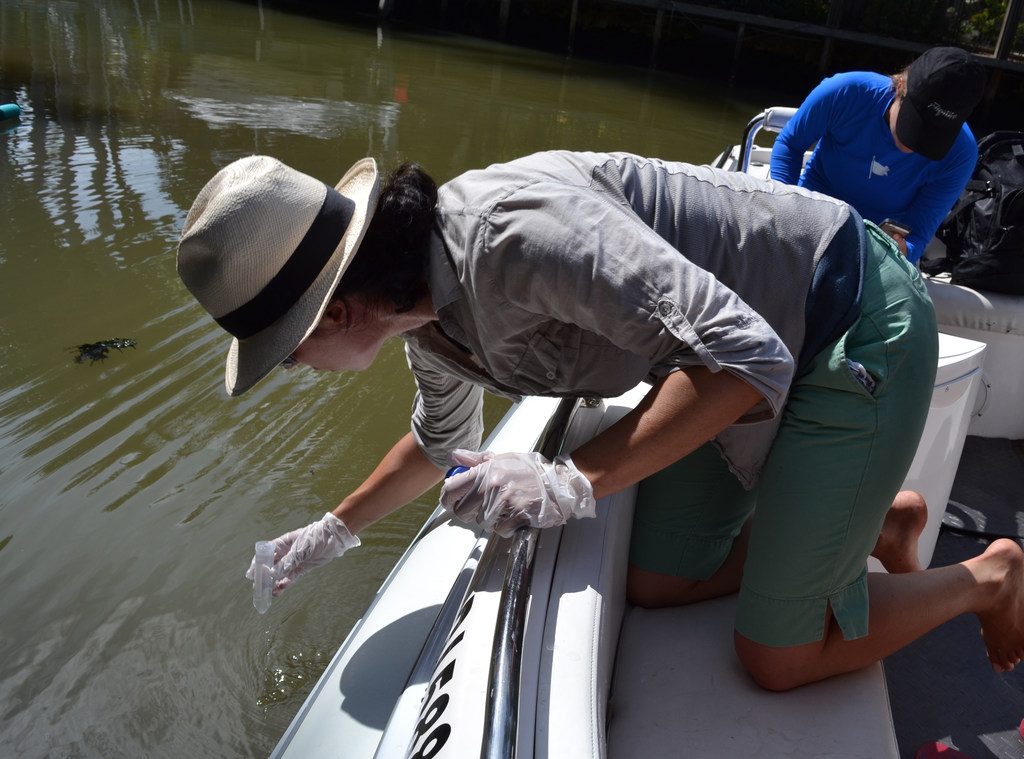South Florida Litigators Haggle Over Environmental Impact of Deregulation Under Trump
Amid a flurry of news on EPA rollbacks and successful court challenges, environmental advocates and attorneys can't agree on the Trump administration's true toll on Americans' health and the environment.
January 30, 2019 at 04:07 PM
6 minute read
 Rachel Silverstein, executive director at Miami Waterkeeper. Courtesy photo
Rachel Silverstein, executive director at Miami Waterkeeper. Courtesy photo
As the two-year mark of the Donald Trump presidency passes, data on the effects of the administration's deregulatory efforts is beginning to emerge. But even as trends become identifiable, South Florida litigators and environmental activists can't seem to agree on exactly what they portend.
The Washington Post reported Jan. 24 that civil penalties levied against polluters have dropped precipitously under Trump. The article cited an analysis conducted by former EPA enforcement official Cynthia Giles showing when adjusted for inflation, civil penalties for pollution have declined to their smallest totals since the EPA's Office of Enforcement and Compliance Assurance was created. Giles' numbers also illustrated offenders are spending less money to become compliant with federal environmental regulations. According to the article, last year's $5.6 billion sum “represents the lowest amount of injunctive relief since 2003” and “is below the roughly $7.8 billion average for the two decades before Trump took office.”
The study's findings are consistent with remarks made to the DBR by Podhurst Orseck partner Steven Marks.
 Steven C. Marks, with Podhurst Orseck. Photo: J. Albert Diaz/ALM
Steven C. Marks, with Podhurst Orseck. Photo: J. Albert Diaz/ALM“I think private enterprise feels less compelled to comply with regulations because they think there's a safe haven now with lax federal government enforcement,” Marks said. “There's this perception the Trump administration has fostered that it's a free-for-all, and you can do whatever you want as long as you make a buck and take care of your shareholders.”
Marks is leading Podhurst Orseck's efforts and litigation regarding the presence of glyphosate, a chemical said to cause cancer, in the weed killer Roundup. After a San Francisco jury delivered a $289 million verdict against Roundup manufacturer Monsanto last August, the doors were opened for class action lawsuits to be filed against the chemical company for the health risks of their products. It's Marks' belief that “under any other normal administration that cared about the health and welfare of its citizens you would see enforcement action,” or “at least investigations of those involved.”
Marks is representing Florida residents who've experienced health issues such as extreme weight loss and impaired bodily functions following exposure to Roundup. He stated it's up to litigators and the courts to pick up the slack on environmental and health regulations where the federal government has faltered.
“The jury system — as long as there's continued access to an independent judiciary — will be the most effective means of changing corporate behavior,” he said.
Related story: San Francisco Jurors Hear Hours of Scientific Data About Herbicide's Link to Cancer
Rachel Silverstein, the executive director for environmental advocacy group Miami Waterkeeper, agrees. Silverstein said litigation has been one of the group's most effective tools in its numerous battles to preserve the well-being of Miami's ecosystem and the cleanliness of its water.
“It's been really empowering, at least for me and for our organization, to be relatively small yet able to bring entities like the federal government or other big organizations to court and to be taken very seriously,” Silverstein said.
Miami Waterkeeper has notched several legal victories. One of its first lawsuits was filed against the Army Corps of Engineers for violating the Endangered Species Act in its dredging of the Florida reef tract off of Miami Beach. The dredging buried over 250 acres of coral reef in sediment, further imperiling corals already at risk for extinction. Following several years of litigation, the Corps opted to settle and committed to restoring part of the reef, an action Silverstein calls “a first step in a long-term restoration.”
Miami Waterkeeper is gearing for more skirmishes, both federally and locally, in the year ahead. Speaking on actions taken by the Trump administration, Silverstein said “a lot of these rule changes and regulatory rollbacks are not compliant with the original intent of Congress when they passed a lot of our seminal environmental laws.”
“Being able to go to court to defend a proper interpretation of a law that's not arbitrary and capricious has been absolutely critical,” she said. “I'm proud to have participated in that but also very grateful for other groups who are stepping up to the plate and using really precious resources to defend the protections we have in place that are under attack.”
Related story: Environmentalists Seek Coral Protection in Port Everglades Project
These efforts seem to be paying off. A report published by CNBC last Thursday claims opponents have blocked or caused more than 90 percent of the Trump administration's deregulatory initiatives to be withdrawn, following legal challenges. The article cites records kept by the Institute for Policy Integrity, a group sponsored by the New York University School of Law, as proof.
“In cases involving the environment, immigration, disabled individuals, affordable housing, student loans and other matters, Trump has been blocked from stripping protections guaranteed by previous administrations,” the article said, referring to the government's low success rate as “unusual.”
Nason, Yeager, Gerson, Harris & Fumero shareholder John Fumero is not surprised.
“Major attempted rollbacks have always been met with legal challenges by conservation groups,” said Fumero, an environmental attorney who once served as general counsel to the South Florida Water Management District. He referred to the legal initiatives of environmentally minded organizations such as the Sierra Club and Audobon Society as “very sophisticated” and “very well-funded.”
 John Fumero, shareholder at Nason, Yeager, Gerson, Harris & Fumero. Courtesy photo
John Fumero, shareholder at Nason, Yeager, Gerson, Harris & Fumero. Courtesy photo“They have been very effective in pushing back any large-scale rollbacks in environmental protection,” Fumero added. “All good systems should have a check and balance, and the reality is litigation is part of that check and balance.”
However, Fumero disagreed with Marks' assertion there's been an increase of bad behavior by private enterprise, at least as far as land use is concerned.
“I haven't seen any major changes in federal wetland permitting in 30 years,” he said. “None.” Fumero could not speak with the same certainty on the long-term viability of environmental litigation. As Trump has the pick of federal judicial appointments who will presumably make pivotal choices on the environment and government regulations, it may be some time before the effects of his presidency are truly felt.
“You're looking at a five- to 10-year horizon before you see the impact of a more conservative federal judiciary be realized,” Fumero said. “Whatever the intentions of the Trump administration are, it's one thing to announce a change, it's another thing to actually following through and make that change.”
This content has been archived. It is available through our partners, LexisNexis® and Bloomberg Law.
To view this content, please continue to their sites.
Not a Lexis Subscriber?
Subscribe Now
Not a Bloomberg Law Subscriber?
Subscribe Now
NOT FOR REPRINT
© 2025 ALM Global, LLC, All Rights Reserved. Request academic re-use from www.copyright.com. All other uses, submit a request to [email protected]. For more information visit Asset & Logo Licensing.
You Might Like
View All
No Two Wildfires Alike: Lawyers Take Different Legal Strategies in California
5 minute read
Holland & Knight Hires Former Davis Wright Tremaine Managing Partner in Seattle
3 minute read
Miami’s Arbitration Week Aims To Cement City’s Status as Dispute Destination
3 minute read
The Inflation Reduction Act: Evaluating Its Impact on Renewable Energy Producers and Analyzing Emerging Needs
Trending Stories
- 1LexisNexis Announces Public Availability of Personalized AI Assistant Protégé
- 2Some Thoughts on What It Takes to Connect With Millennial Jurors
- 3Artificial Wisdom or Automated Folly? Practical Considerations for Arbitration Practitioners to Address the AI Conundrum
- 4The New Global M&A Kings All Have Something in Common
- 5Big Law Aims to Make DEI Less Divisive in Trump's Second Term
Who Got The Work
J. Brugh Lower of Gibbons has entered an appearance for industrial equipment supplier Devco Corporation in a pending trademark infringement lawsuit. The suit, accusing the defendant of selling knock-off Graco products, was filed Dec. 18 in New Jersey District Court by Rivkin Radler on behalf of Graco Inc. and Graco Minnesota. The case, assigned to U.S. District Judge Zahid N. Quraishi, is 3:24-cv-11294, Graco Inc. et al v. Devco Corporation.
Who Got The Work
Rebecca Maller-Stein and Kent A. Yalowitz of Arnold & Porter Kaye Scholer have entered their appearances for Hanaco Venture Capital and its executives, Lior Prosor and David Frankel, in a pending securities lawsuit. The action, filed on Dec. 24 in New York Southern District Court by Zell, Aron & Co. on behalf of Goldeneye Advisors, accuses the defendants of negligently and fraudulently managing the plaintiff's $1 million investment. The case, assigned to U.S. District Judge Vernon S. Broderick, is 1:24-cv-09918, Goldeneye Advisors, LLC v. Hanaco Venture Capital, Ltd. et al.
Who Got The Work
Attorneys from A&O Shearman has stepped in as defense counsel for Toronto-Dominion Bank and other defendants in a pending securities class action. The suit, filed Dec. 11 in New York Southern District Court by Bleichmar Fonti & Auld, accuses the defendants of concealing the bank's 'pervasive' deficiencies in regards to its compliance with the Bank Secrecy Act and the quality of its anti-money laundering controls. The case, assigned to U.S. District Judge Arun Subramanian, is 1:24-cv-09445, Gonzalez v. The Toronto-Dominion Bank et al.
Who Got The Work
Crown Castle International, a Pennsylvania company providing shared communications infrastructure, has turned to Luke D. Wolf of Gordon Rees Scully Mansukhani to fend off a pending breach-of-contract lawsuit. The court action, filed Nov. 25 in Michigan Eastern District Court by Hooper Hathaway PC on behalf of The Town Residences LLC, accuses Crown Castle of failing to transfer approximately $30,000 in utility payments from T-Mobile in breach of a roof-top lease and assignment agreement. The case, assigned to U.S. District Judge Susan K. Declercq, is 2:24-cv-13131, The Town Residences LLC v. T-Mobile US, Inc. et al.
Who Got The Work
Wilfred P. Coronato and Daniel M. Schwartz of McCarter & English have stepped in as defense counsel to Electrolux Home Products Inc. in a pending product liability lawsuit. The court action, filed Nov. 26 in New York Eastern District Court by Poulos Lopiccolo PC and Nagel Rice LLP on behalf of David Stern, alleges that the defendant's refrigerators’ drawers and shelving repeatedly break and fall apart within months after purchase. The case, assigned to U.S. District Judge Joan M. Azrack, is 2:24-cv-08204, Stern v. Electrolux Home Products, Inc.
Featured Firms
Law Offices of Gary Martin Hays & Associates, P.C.
(470) 294-1674
Law Offices of Mark E. Salomone
(857) 444-6468
Smith & Hassler
(713) 739-1250






